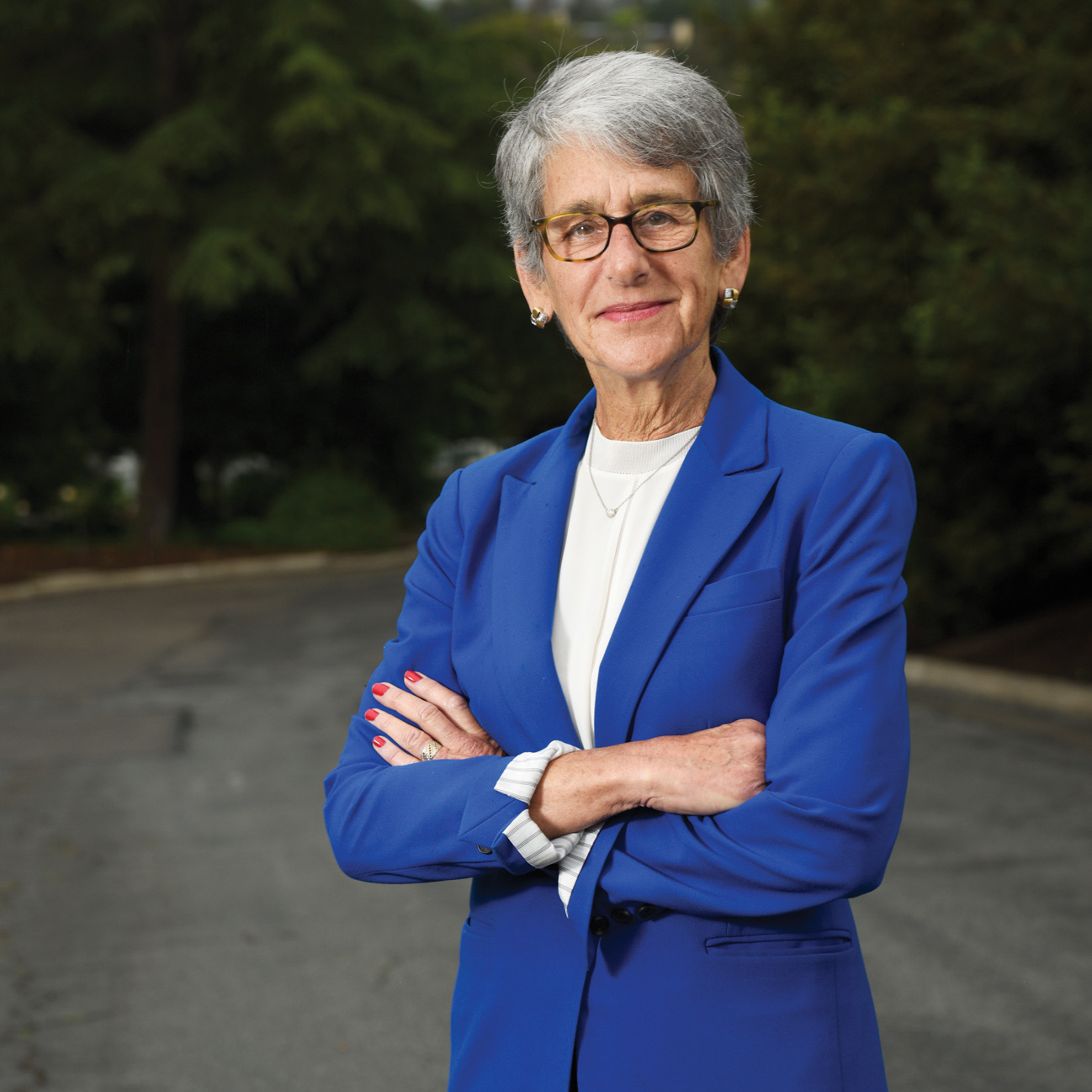
Senator Hannah-Beth Jackson Reflects on a Distinguished Career
In the Home Stretch of Her Final Term, She’s Showing No Signs of Slowing
By Jerry Roberts | Published May 8, 2019
Hannah-Beth Jackson alighted from the family’s all-electric Chevy Bolt, hustling to a final meeting in her district before winging off to another workweek in Sacramento.
It was a dozy Monday morning, but Santa Barbara’s State Senator was already in fifth gear.
As energetic as the junior tennis champion she was a lifetime ago, Jackson strode into the Santa Barbara Independent’s office and somehow simultaneously greeted the paper’s receptionist, displayed a possible quick outfit change to a photographer (“Paul, if you wanted a different look, I brought this”), and raved to an erstwhile Sacramento reporter about Contour Airlines’ brand-new, direct flight from Santa Barbara to the Capitol.
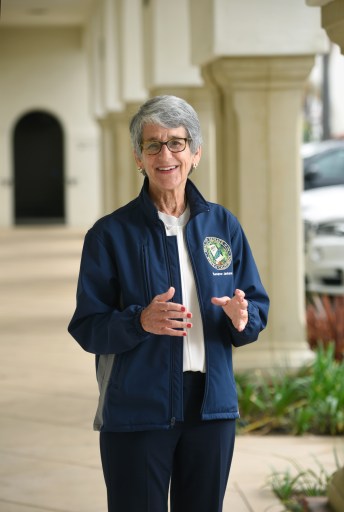
“Oh my goodness, yes! I hope it continues,” she said, in an improvisational conversation style featuring countless commas, a paucity of periods, and transitions that connect discrete thoughts with the phrase “you know.”
“We won’t be able to use it every time, but boy, instead of it, on a normal Monday morning, I would have to take that eight or nine o’clock flight [from L.A.], I’d have to get up by five, be out of the house by six, so I’m three hours just to get to the airplane and get in the air and then the flight up and what have you, it’s almost as easy to drive, but the drive’s a bear. Here, it’s 15 minutes.”
Memo to Contour Airlines: Sign this woman up.
Days before her 69th birthday, Jackson is sprinting through the home stretch of her final, four-year term, headed for the finish of a distinguished legislative career.
Passionate, substantive, and indefatigable, Jackson in recent years has quietly emerged as a master legislator, author of nationally recognized progressive measures that serve as policy models for other states. Chair of the Senate Judiciary Committee, she has become the most influential player representing Santa Barbara in the Capitol since the glory days of former senators Gary Hart and Jack O’Connell.
“I feel as though I still have much to offer,” she said, shrugging off a question about post-Sacramento plans. “I feel as though I have been very successful in a lot of areas that have been sort of groundbreaking.”
Left Field All-Star
Jackson first went to the Legislature 20 years ago, when she won election to the state Assembly. Then, she was one of a dozen often-frustrated members of the Assembly’s progressive caucus, out of favor with a moderate Democratic governor and frequently thwarted by determined Republican legislative minorities.
Today, she is squarely in the Capitol mainstream.
Democrats now completely dominate California politics: Gavin Newsom is the state’s most liberal governor since Pat Brown six decades ago, and the party holds every constitutional office and three-fourths of the seats in the Legislature.
It is fertile ground for Jackson’s ambitious agenda, which gladdens consumer advocates, environmentalists, feminists, trial lawyers, and unions and infuriates the California Chamber of Commerce (her arch-nemesis) and other business groups.
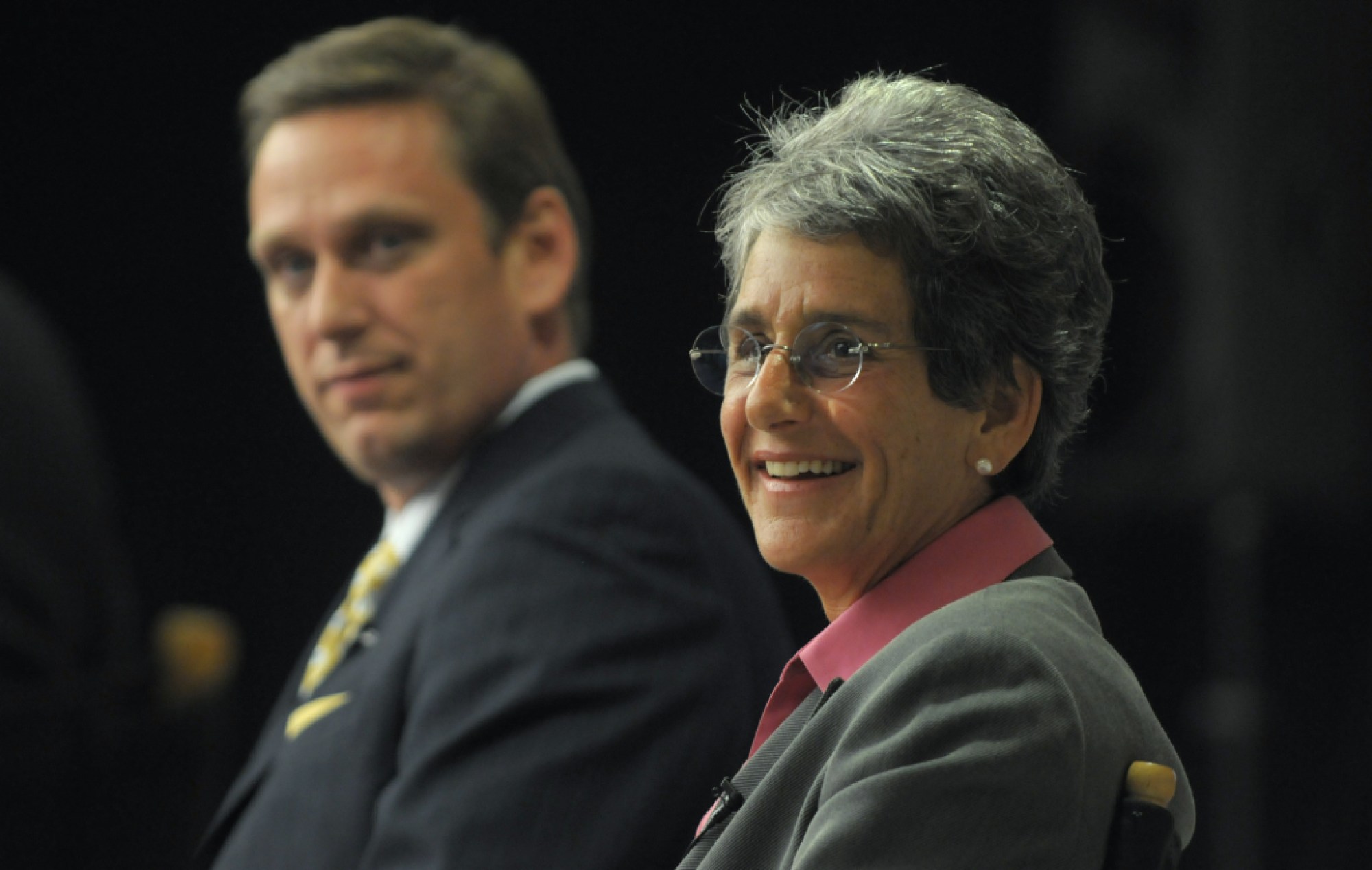
In a sit-down interview last week, Jackson offered intriguing glimpses of behind-the-scenes strategies and maneuvers from her legislative battles to improve pay, social benefits, and workplace culture for women and families. Discussing a host of state and local issues, Jackson:
• Revealed that she is trying to persuade Assemblymember Monique Limón to run for her Senate seat next year, a move that would scramble the local political landscape.
• Expressed her current opposition to Senate Bill 50, the sweeping and controversial housing measure before the Legislature, saying it would subvert local planning control.
• Outlined her most ambitious initiative of the session, an effort to roll back entrenched state tax business credits, which the Chamber assails as a “$20 billion tax increase.”
• Described Governor Newsom as “visionary,” comparing him favorably to former governor Jerry Brown, whom she said was “very cautious in a lot of ways.”
• Discussed how her past fight against cancer affected her personally and set the stage for the political success she has found in the Senate.
“I think everyone who’s been through cancer, or a life-threatening disease, and comes out the other end recognizes there is a gift to that kind of situation,” she said. “You recognize life is limited and there are certain things that are really more important to you than others and you pursue those.”
Eight Days a Week
Jackson’s 19th Senate District, one of 40 in the state, includes all of Santa Barbara County and much of Ventura County. About 930,000 people live in the district, a population nearly twice as large as that of Wyoming, which is represented in Congress by two U.S. Senators and one House member.
It’s not a 9-to-5 gig.
A recent weekday schedule shows her in Sacramento floor sessions, committee hearings, briefings, or caucuses for nearly 60 hours — exclusive of weekends and other time she spends in the district with civic groups and constituents for banquets, breakfasts, celebrations, dinners, forums, fundraisers, parades, receptions, speeches, and other public events.
“This job, in spite of what some of the anti-government people think, is an eight-day-a-week job,” she said. “I was working until 9:30 last night on a Sunday. We have hearings until 10 o’clock this week. You know, the day starts at 7:30-8 o’clock. It’s all-consuming.”
Married to retired Superior Court Judge George Eskin, with whom she dotes on six grandchildren, Jackson first was elected to the Assembly in 1998, terming out in 2004.
Those with long memories recall a remarkable episode during that stretch, which unfolded in the summer of 2003, as the Capitol gridlocked over passage of an overdue budget.
At the time, minority Republicans had enough numbers to block fiscal measures they hated, and the “budget crisis” became an annual event. Behind closed doors, Jackson and 10 other members of the Assembly’s left-liberal Democratic Study Group plotted, discussing the notion of deliberately prolonging the crisis, the better to cast blame on the GOP while building public support for an initiative making it easier to raise taxes.
Alas for the cabal, a microphone in the room was live, and their confab was broadcast throughout the Capitol, via 500 squawk boxes with which legislators, staffers, and reporters track public meetings from their offices.
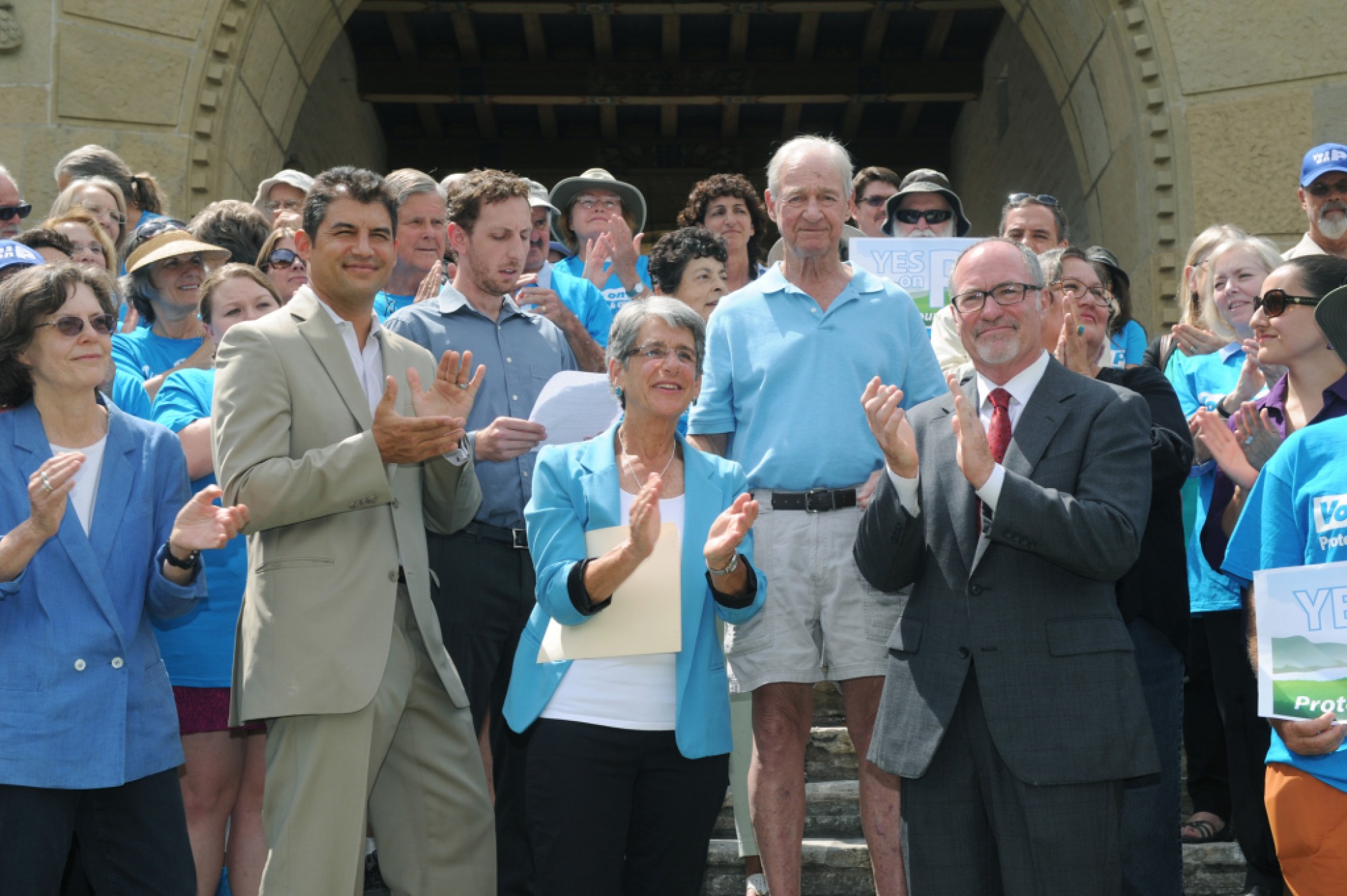
Beyond embarrassing news reports detailing the secret session, a far greater indignity was visited upon Jackson during that time by the storied San Francisco pol John Burton. Then president of the Senate, he controlled the redrawing of legislative district maps following the 2000 Census.
Burton’s redistricting amounted to an incumbent protection plan, benefiting reigning office holders of both parties. Among other ploys, it reconfigured the Central Coast’s Senate district to favor Republican incumbent Tom McClintock — rather than the aspirations of termed-out, fellow Democrat Jackson, who was left without a seat when the music stopped.
Out of office, she spent several years in the political wilderness, teaching public policy at UCSB and Antioch, hosting a radio show, and working with nonprofits.
In 2008, McClintock ran for Congress, and Jackson tried but failed to win his old seat; demonstrating how precisely Burton gamed a slight Republican edge into the district, she lost an agonizingly close race to McClintock aide Tony Strickland, by 857 votes out of 415,109 cast.
It was a painful loss and came just one year after Jackson fought and beat cancer.
“I think life has a way of humbling us … when you go through experiences like that… You begin to realize that you can’t accomplish everything.”
Illness afforded new perspective.
“I think life has a way of humbling us … when you go through experiences like that,” she said. “I think you begin to realize that you can’t accomplish everything.”
Jackson finally won a Senate seat in 2012. By then, voters had taken the power of redistricting away from politicians and given it to an independent commission, established by ballot initiative, that redrew gerrymandered districts throughout California.
In the new district, she stomped Republican Mike Stoker, now Donald Trump’s EPA regional administrator.
The Scandinavia Connection
At a time when Trump Republicans daily bash Democratic policy proposals as Euro-style “socialism,” Jackson is not shy about acknowledging the Nordic roots of some of her bills, like one she’s carrying now to expand California’s family leave law.
“We look at countries in the world that do this, and I have a particular interest in the fact that Scandinavia does this,” she said, “and they are a robust set of countries, which provide sometimes up to a year, a year and a half of job-protected and paid family leave because they recognize the importance of this family relationship.”
The state Chamber of Commerce, less enamored of Denmark and Sweden, registers her measure, Senate Bill 135, on its “Job Killers” list, however.
“Job Killers,” a masterstroke of political marketing, is a tool by which the influential business group annually — and usually successfully — identifies bills they analyze as anti-business and organizes opposition.
On its Job Killers website, cajobkillers.com, “The Graveyard” page carries a running total of defeated bills, asserting that since the list began in 1997, it’s helped prevent “92% of these onerous proposals from becoming law.”
Jackson, who got a zero ranking on the Chamber’s most recent “Best Votes” list, often finds her bills trashed as “job killers”; according to the site, SB 135 “significantly harms small employers in California with as few as five employees.”
“I’m very proud to have bills on that list,” Jackson smiled.
HBJ vs. The Chamber
Jackson fought and overcame “Job Killer” status in winning enactment of the two signature pieces of her legislative career.
In 2015, she passed the California Fair Pay Act, now one of the nation’s toughest laws addressing the gender pay gap.
Among other features, it makes a company’s salary data more transparent, protects employees who complain of pay discrimination, and puts the burden on employers to prove that male-female disparities in pay did not arise because of gender.
Jackson said she began working on the issue when Jerry Brown appointed her to the state Commission on the Status of Women during his first incarnation as governor. “Back then, women were making 57 cents for every dollar a man was making,” she said.
Today, the gap is “82 cents for white women,” she added. “If you’re a woman of color, if you’re African-American, about 64 cents, and if you’re Latino, about 44 cents.”
Her bill got a big boost at the 2015 Academy Awards, when Patricia Arquette won the Best Actress Oscar, and used her acceptance speech to express outrage about the film industry’s wage gap. Her remarks instantly went viral.
“That lit the match,” Jackson remembered. “If you recall the moment, they panned the audience and there was J-Lo standing with Meryl Streep, so the generations, the different ethnic and racial divide, standing up in unison, calling for equal pay.
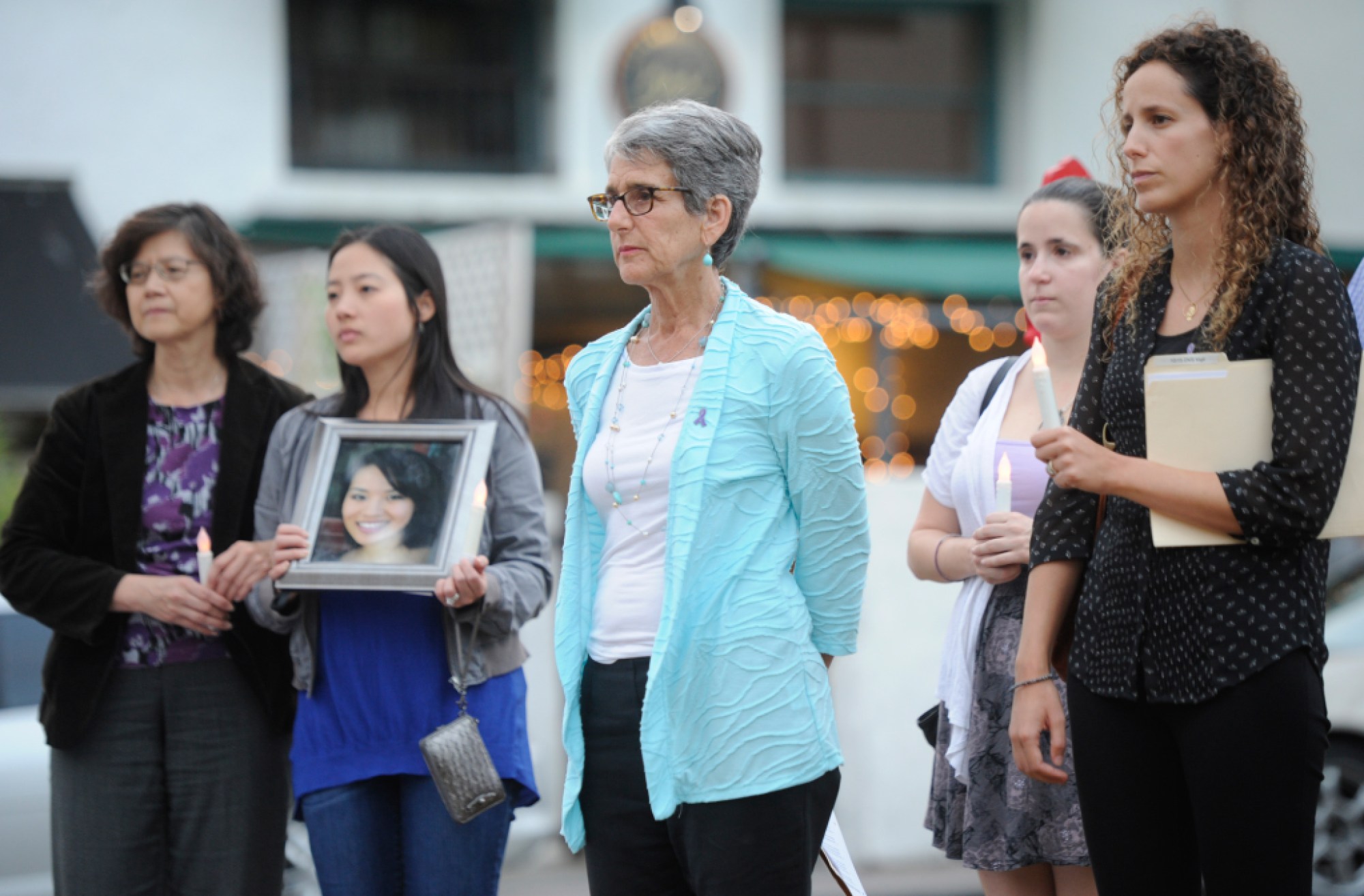
“And I knew at that moment, this was the opportunity, and I introduced this bill, with Patricia Arquette’s participation.”
Hollywood buzz or no, she still had to confront “Job Killers.”
When the Chamber opposed the bill as undue government regulation, Jackson invited a lobbyist for the group to chat.
“Their chief lobbyist, an attractive woman in her early forties, probably one of the best lobbyists in Sacramento, knows her stuff,” Jackson said, setting the scene.
“I brought her in and I sat across from her and I said, ‘I’m bringing a bill on equal pay and I want your support because I know that you are one of the best lobbyists here and I know you’re not paid what your male counterparts are paid.’
“And so in good lobbyist fashion she just smiled, and I said, ‘So let’s work together on this,’ and we did.”
“Part of this job is being able to find the sweet spot.”
Over the next months, Jackson amended the bill, tweaking legal language to address some of the Chamber’s particular concerns.
When the deal went down, the “job killer” designation was dropped.
“Part of this job is being able to find the sweet spot,” she said. “Getting everybody in a room and saying, ‘This is what we need; help us get there.’ I think that is something that I bring to the table.
“The Chamber initially was opposed to it, and then they became neutral on the bill,” Jackson added, “because we were able to find that sweet spot on the legislation.”
C-Suite Glass Ceiling
Last year, Santa Barbara’s senator again won national attention.
Aided by Democratic mega-majorities, she ploughed through business opposition to pass a bill, signed by Jerry Brown, requiring California corporations to include women on their boards of directors.
“This, and equal pay, are two of my proudest accomplishments, because they have national significance as well as importance for the state,” she said.
“There was all sorts of hoopla” about the measure, Jackson recalled. “I think it was a ‘Job Killer’ bill for the Chamber, and I have no idea what they are talking about when they say that.
“They just frankly don’t like change,” she said. “They like things the way they are, because they have been running the country, and the world, for a long time.”
Tax Breaks Broken?
This year, Jackson faces the Chamber’s ’s antagonism on yet another high-profile bill.
Amid considerable media attention, she is carrying SB 468, aimed at clawing back billions of dollars in tax breaks the state has extended to various industries, from agriculture to Silicon Valley.
The Chamber is aghast at this one, describing it on its site as a “$20 billion tax increase.”
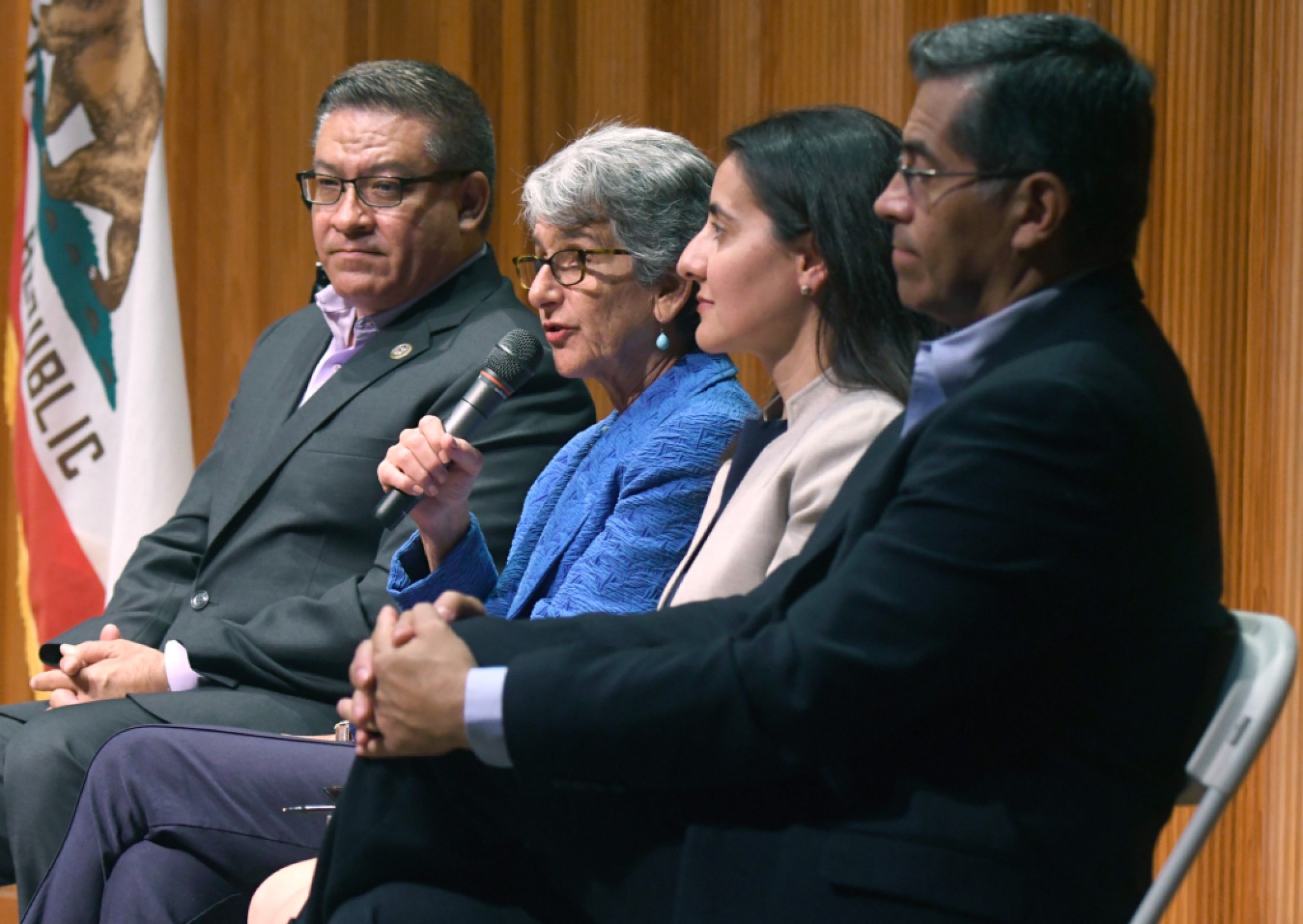
“Just call it what it is,” countered Jackson. “It’s corporate welfare.”
“There are a number of tax credits out there … and we have never asked the questions: What were they intended to accomplish? Did they accomplish that? Are they still viable?
“In some instances, the answer will be yes, and in some instances the answer might not be yes, but we’ve never asked the question. So this is an effort to call upon these companies to justify their corporate welfare.
“And I’ll tell you, this bill is very challenged right now, you know, because these are big corporations,” she said.
What Next?
As the Legislature heads into budget season, Jackson is carrying 18 bills, involving expansion of services for the elderly, increased privacy protections for people’s online data, and emergency disaster response, among other issues.
She’s also in the mix in high-stakes deliberations over the amount of liability public utilities should bear in deadly catastrophes like the Thomas Fire and Montecito debris flow.
“This is one of those areas that I don’t know that most people in the community know I’ve been working on,” she said. “The number-one rule of government is to keep this community safe.”
And has she given thought to what she’ll do when her final term ends?
“I really haven’t,” she said. “Well, I have given thought to the fact that I am probably going to sleep for a few months.”
Q&A : Cutting to the Chase
Here are a handful of excerpts from the Independent’s lengthy interview with Senator Jackson. They have been edited for clarity and length.
Have you given any thought to what you’re going to do next?
I really haven’t. I mean, I feel as though I still have much to offer. I feel as though I have been very successful in a lot of areas that have been sort of groundbreaking. Well, I have given thought to the fact that I am probably going to sleep for a few months. Take more walks on the beach. I think I want to have more flexibility. I’ve got grandkids, and I want to be able to spend more time with them.
I’m not seeing you puttering around the garden.
There are things that I’ve loved doing. I love doing commentary and radio. I loved it when I had my radio show; I think I have a lot to offer, maybe in a consulting form, based upon the years of experience and having been successful.
You know, part of this job is being able to find the sweet spot. Getting everybody in a room and saying, “This is what we need; help us get there.” I think that is something that I could bring to the table, but you know, I just, I honestly don’t know.
“I would love to see Monique take my position. I think she’d be great.”
Have you been successful in convincing [Assemblymember] Monique Limón to run for your seat next year?
You’ll have to ask Monique. I hope; I hope. I would love to see Monique take my position. I think she’d be great; they love her up in Sacramento. She is smart, she’s hardworking, she’s honest, she has tremendous integrity, good values, [and] is respected by everyone up there. I hope she’ll say yes.
What about running for local office?
I don’t think so. I mean, it’s not something that feels right to me at the moment. I don’t ever say never about anything, because life is what happens when you’re busy making plans. … I’ve worked extremely hard at this job because I love it, and I feel as though I can help make a difference, but I don’t want to work quite as hard. So I don’t know what that means.
This town needs work. You know, I’ve lived here for 40 years and I walk down State Street and it just depresses the hell out of me. Depresses the hell out of me.
Maybe you should run for mayor. I’m going to start a rumor that you’re going to run for mayor.
Don’t do that to me.
Do you support Senate Bill 50, the sweeping housing bill that would mandate local communities to build more and more dense housing?
Not in its current form. No.
I don’t believe that one size fits all; it’s a cookie-cutter approach. The author of the bill [state senator Scott Wiener] represents San Francisco. I understand San Francisco is growing way too fast, but I represent Santa Barbara County and Ventura County. We have taken great pains and great pride in developing a community that maintains our quality of life, that respects our beautiful, natural environment, and that we want to preserve and protect.
And at the same time, we have done a pretty good job at dealing with the need to create more affordable housing. It’s not ideal, but a lot of this is a supply and demand issue. This is a very highly sought-after place to live, and we don’t want it to look like Miami Beach, and frankly, I don’t want California to look like Miami Beach. So we need to do more, we need to do better, but I think taking away that local control is just not acceptable to me and not acceptable as a representative of this area.
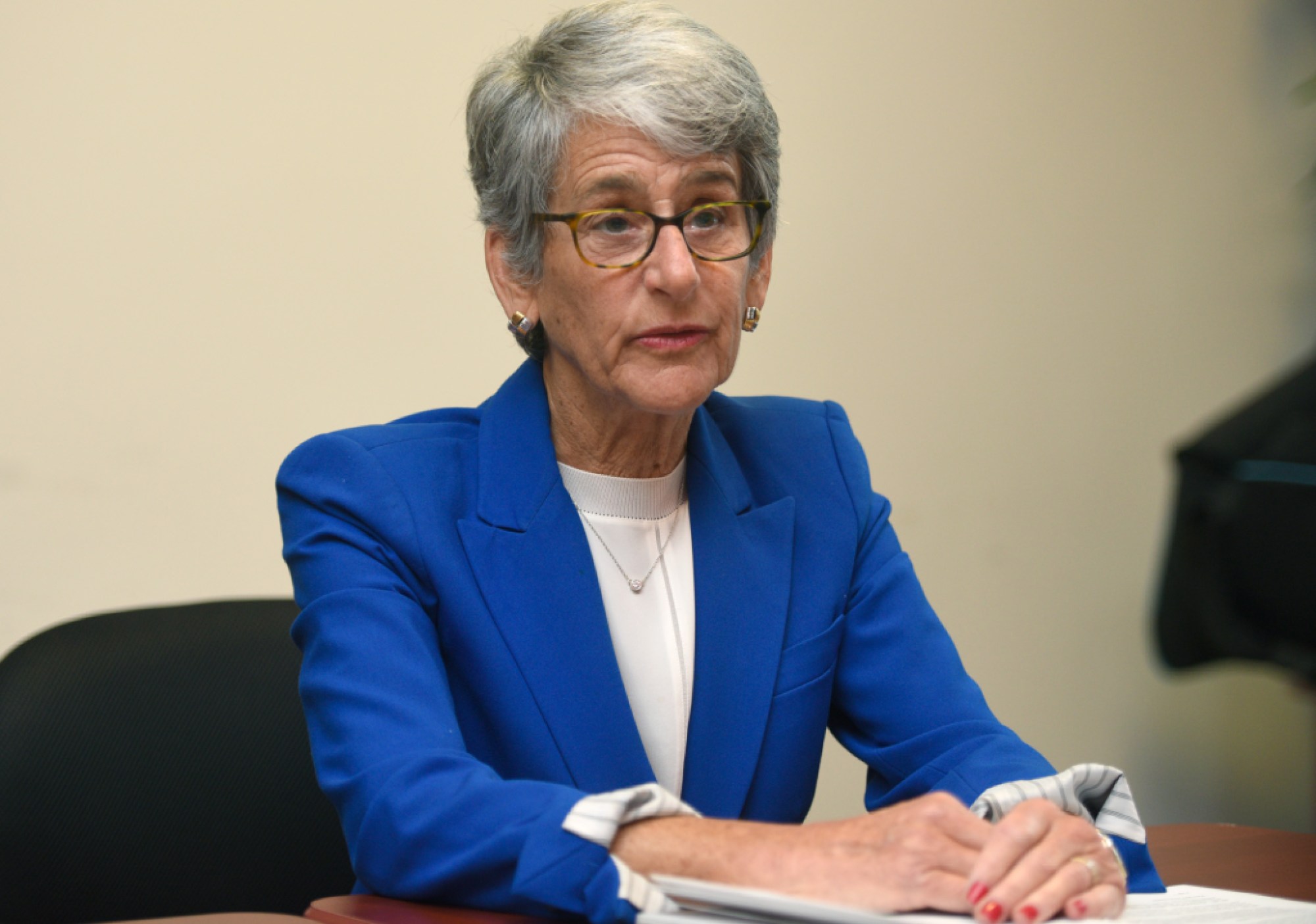
Your signature accomplishment is the Fair Pay bill, signed into law in 2015. Describe how you made that happen.
I had been working on equal pay a long time. I was appointed, I think in 1979, to the state Commission on the Status of Women by Jerry Brown the First, and equal pay was a big issue for us then, when women were making 57 cents for every dollar a man was making.
Now it’s up to what?
Eighty-two cents for white women. If you’re a woman of color, if you’re African American, about 64 cents, and if you’re Latino, you’re at about 44 cents.
So what happened?
I had been wanting to do legislation on this and I felt the time was right; we had data that showed that we were not making progress the way we should be making it.
Then, I think it was in February [2015], [actress] Patricia Arquette won the Academy Award for Best Actress and used her acceptance to call for equal pay. And if you recall that moment, they panned the audience and there was J-Lo standing with Meryl Streep, so the generations [and] the different ethnic and racial divide [was] standing up in unison, calling for equal pay. And I knew at the moment that this was the opportunity, and I introduced this bill with Patricia Arquette’s participation, actually.
So this sort of lit the match.
And what I did was, knowing that we have women in positions of power and influence today who are not being paid equally, I brought to my office the woman who at the time was the chief lobbyist for the Chamber of Commerce. The California Chamber of Commerce has been one of the biggest obstacles to equal pay legislation.
“I said, “I’m bringing a bill on equal pay and I want your support because I know that you are one of the best lobbyists here and I know you’re not paid what your male counterparts are paid.””
Their chief lobbyist, an attractive woman in her early forties, probably one of the best lobbyists in Sacramento: knows her stuff, very articulate. I brought her in and I sat across from her, and I said, “I’m bringing a bill on equal pay and I want your support because I know that you are one of the best lobbyists here and I know you’re not paid what your male counterparts are paid.” And so, in good lobbyist fashion, she just smiled, and I said, “So let’s work together on this,” and we did.
One of the things, going back to the old paradigm — they hated the notion apparently of the concepts of equal pay for “comparable work.” And I remember saying to [the lobbyist], “Okay, you don’t like that expression; give me something else.” So she said “substantially similar work.” I thought about it — comparable, substantial — I said fine, we’ll go with that. It means the same thing to me, but sometimes you have to recognize there are red flags and old wounds that exist.
So we started working on the concept of “equal pay for substantially similar work” and knocked out this legislation. The chamber initially was opposed to it, and then they became neutral on the bill, and then ultimately they supported the bill because we were able to find that sweet spot in the legislation.
Another significant measure, which you passed last year, requires more women on corporate boards of directors in California. Where does that stand?
This and equal pay are two of my proudest accomplishments because they have national significance as well as importance for the state.
Back in 2013, I worked with a group called the National Association of Women Business Owners. This group is probably 50 percent Republican women and 50 percent Democratic women, and they were frustrated, as was I, that our corporate leadership boards are one of the last areas of complete male domination. It is very difficult to get these corporations to change their ways.
I offered a resolution in 2013 calling on California’s publicly traded companies — companies headquartered in California that are publicly traded; the big ones — to bring more women onto their corporate boards. And we provided all sorts of data that shows that corporations that have a critical number of women on their boards are more profitable, they’re more productive, they have better governance, [and] they have greater transparency. It’s a win-win for the corporation.
They have been doing it in Europe for a number of years, and [the resolution] urged them to improve and expand on the number of women on their boards. At the time, 15.5 percent of all corporate board seats in California were held by women. We looked at it in 2018, and the number had moved all the way up to 16 percent. We hadn’t made any progress.
With the sponsorship and the help of NAWBO, I introduced a bill that requires that we put women on corporate boards. If it’s board of five or under, there has to be at least one woman on the board by the end of this year, and more for boards that have six or more, nine or more.… If the board is 10 or more, at least three women [are required]. We consider that to be a critical mass of women.
There were all sorts of hoopla about it. I think it was a “job-killer” bill for the Chamber, and I have no idea what they are talking about when they say that. They just frankly don’t like change; they like things the way they are because they have been running the country and the world for a long time. The bill got through; we did it.
And the bill got to the governor’s desk and he had 30 days to sign it. On the 30th day, I was in Chicago at the time and my daughter, Ms. Know It All, said, “You know, Mom, the governor’s not going to sign that bill; there is no way he’s going to sign it.” Well, what she didn’t factor in was the fact that just three days before, there had been the Kavanaugh hearings, and [Governor Brown] and Anne [and two] other women who were his top advisors watched those hearings with him, and I’m told Anne said to him, “Jerry, you’re going to sign this bill.”
And he did, and he wrote a signing statement that basically said there may be some issues here but this is long overdue, and he sent a copy of it to the Judiciary Committee in the United States Senate, and I have a copy of it. That’s going up on my wall along with the signing statement that he wrote on the bill, and … Anne signed it after he did.
You’ve worked with a number of governors. Compare and contrast Jerry Brown and Gavin Newsom.
That’s an interesting one. Jerry was a great pragmatist, a very interesting guy, very well-read, very erudite, and very cautious in a lot of ways. In his second go-round as governor [2010-2019], he didn’t see his role as being the visionary. He was the pragmatist; he wanted to keep California thriving but didn’t necessarily envision what the future looks like, with artificial intelligence, with technology, with the need of families to balance work and home. He had no kids.
I think he was a great leader for his time and righted the ship when we were in the midst of a terrible downturn. I’m not sure that that has been cured, because a lot of that downturn is in the way we do taxes in this state.
And Gavin?
I really am impressed with Gavin. He also is incredibly well-read, and very thoughtful, but he’s really more visionary; he’s the next generation. You talk to this guy and it’s sort of — what is it, the [Robert] Kennedy statement? — he doesn’t ask why; he asks why not, and you know he’s put so many ideas out there, like spaghetti on a wall, and whatever sticks will stick.
“I really am impressed with Gavin. He also is incredibly well-read, and very thoughtful, but he’s really more visionary; he’s the next generation.”
I think he’s made some very courageous steps. People say “Oh, well, it’s all calculated.” Well, maybe it is, but nobody else is talking about it. He did that with same-sex marriage in San Francisco. I think he also did that when it came to universal healthcare in the city of San Francisco.
He talks now about the death penalty; you know I don’t necessarily agree, but I don’t disagree. I think he’s made a very thoughtful case for it, and I think that encouraging that kind of dialogue really is what we need to move beyond sort of the old way of doing things.
You’ve gotten a lot of notice recently for a bill to reexamine state government “tax expenditures” that benefit some businesses and industries. Tax expenditures always struck me as one of those government words that carries this underlying message by the government, which is, “It’s our money and we’ll give it back to you if we want.”
No, no, no, these are tax credits; most of them are corporate tax breaks. Just call them what it is: It’s corporate welfare — absolutely.
Now, some of these tax breaks have benefited the state and do benefit the state. For example, we now have a tax break; we give a tax expenditure to the entertainment industry. It’s, I think, $400 million a year.
And what we’ve discovered is that the entertainment industry brings in billions of dollars for the state of California. So if I give you a dollar and you give me back 10, I’m going to give you that dollar. But if I give you a dollar and I get back 20 cents, do I really want to keep giving you that dollar?
So there are a number of tax credits out there that started as early as 1940 that we have never asked that question [about]! What were they intended to accomplish? Did they accomplish that? Are they still viable? Are they still accomplishing that, and if so, should we continue using them?
In some instances, the answer will be yes, but in some instances, the answer might not be yes. But we’ve never asked the question, and so that’s what this effort is: to call upon these companies to justify their corporate welfare. We took the top nine in terms of dollars, in terms of breaks, and I’ll tell you this bill is very challenged right now. You know these are big corporations.
Silicon Valley doesn’t like it.
They don’t like it — they have a [research and development] credit. We have a credit for farm equipment; they don’t like the bill either. And what I keep saying is, “Look, if it’s serving its purpose, if it’s a tax benefit to California, we’ll keep it.”
I’m basically trying to go back to what are billions of dollars in tax credits which would otherwise be money that would go into our schools. We all want to put more into education, and that’s basically money out of our general fund that if it were back in the general fund, 40 percent of it would be going to our kids and their education.
Pacific Gas & Electric Co. is in bankruptcy over legal liabilities involving their equipment in massive wildfires. Southern California Edison is not in bankruptcy but has financial problems involving the same problem. You’ve been involved in trying to figure out what state government should do about this complex set of issues.
I was down in San Diego about three or four weeks ago and visited with San Diego Gas and Electric, [which has] set up the most advanced, the most technologically effective system down there to address weather and wildfires.
They hired the best and the brightest meteorologists, the best and the brightest people in the tech world, and they have created a system so that they know what the weather is going to be three or four days before it happens so that they can give warnings, so that they can pre-position fire equipment, so that their equipment is all hardened. And they make sure that everything around it has been cleared, that they use poles that aren’t likely to burn, that they have coated their lines so they don’t burn, [and] that they’re not going to be subject to high winds.
They took their responsibility seriously, and that’s what I want to see Edison do, and that’s what I want to see PG&E do. They can do it, but PG&E has a terrible culture and history of being only profit-driven, and Edison has been somewhere in the middle.
They don’t want to be liable if a fire is caused by their product [and] they don’t feel it was their fault, unless there was negligence. But think about it: We let Edison put its wires above or underneath our property; we give them these easements because they are serving the public. I don’t particularly want to have a pole on my property or underground under my property, but we say as a state that this is for the better good of the community. With that comes responsibility, and the responsibility is to harden that infrastructure, to protect that infrastructure as much as humanly possible, to protect against these events happening. I submit to you if they did all the things that they’ve done down in San Diego; it’s expensive, but….
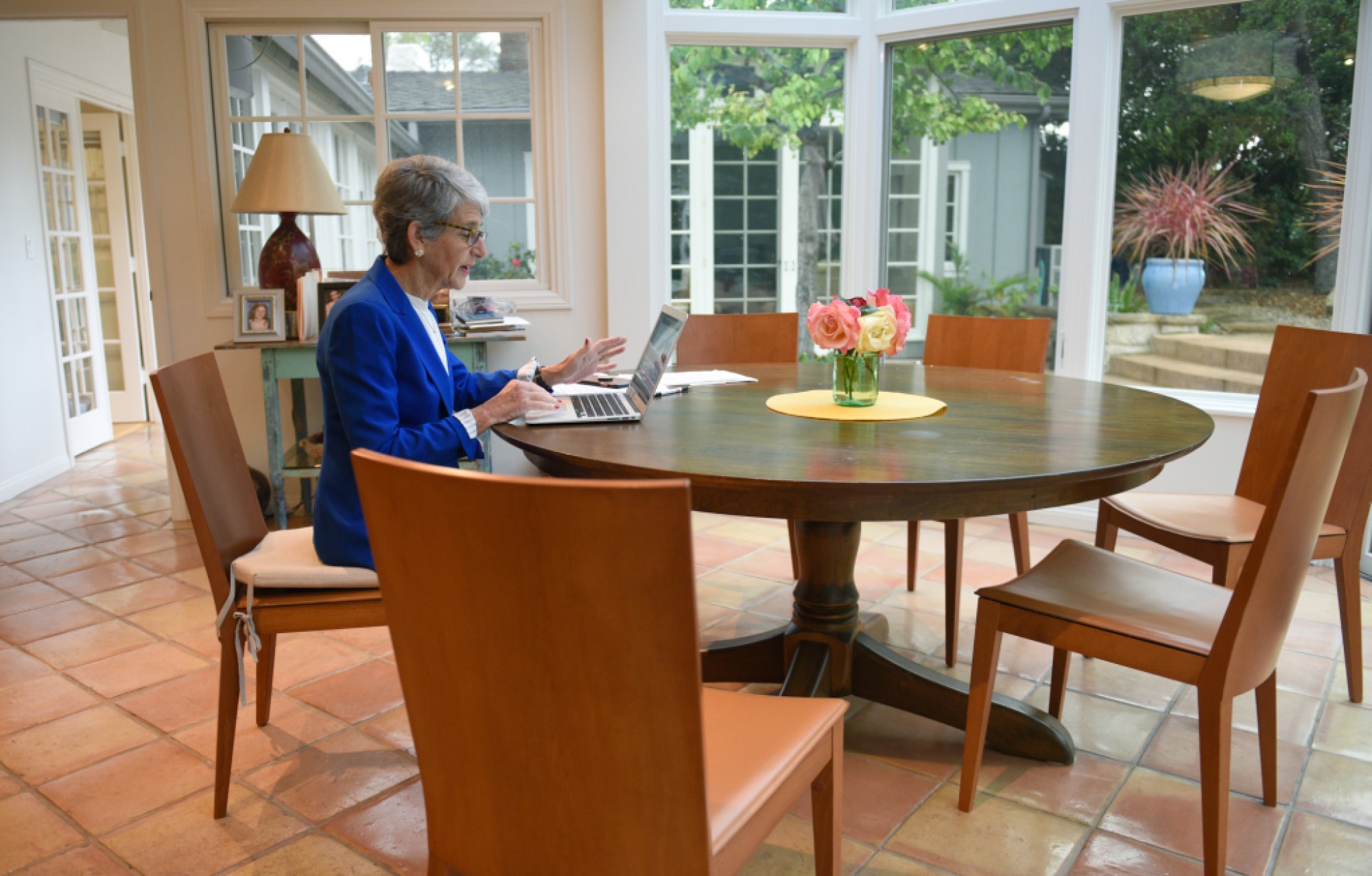
Then it’s okay to pass those costs onto ratepayers?
Yes. You know, we have to be realistic. Here’s the problem: We say to these companies — it’s called inverse condemnation — “We give you the right to go onto people’s property, so you have a responsibility to those people, and you have full liability.”
Strict liability: if there is a fire that is caused by your equipment. We don’t care why; you have to pay. That is strict liability. They want to reduce that liability to negligence, meaning if it really wasn’t their fault, lightning struck, and even though [their] wires weren’t maybe the best, it wasn’t negligence, so [they] shouldn’t have to pay.
Well, when you think about it, they haven’t tried to do the right thing with full liability, so why do we think they are going to do the right thing when they have less liability? It just doesn’t make sense.
By any measure, your second turn in Sacramento has been more successful than your first, when you served in the Assembly. You had some significant life events in that period of time, including a successful battle with cancer. How did that experience affect you politically?
I think you begin to realize that you can’t accomplish everything and that sometimes, you know, half a loaf is better than none. I wouldn’t say I’ve set my sights low; it’s just I have recognized that you can’t always … get what you want. An old song — who was that?
I’m pretty sure it was the Rolling Stones.
Oh, was it? There you go.
Yeah, I think life has a way of humbling us a little bit when you go through experiences like that. It’s one of those things that I think everyone who’s been through cancer or a life-threatening disease, and come out, thank God, the other end, who’s still here, recognizes there is a gift to that kind of situation. You recognize that life is limited and there are certain things that are really more important to you than others, and you pursue those:
When you look at Trump, you look at what the Republican party has become. Are you fearful for your grandchildren?
I am very fearful for them.
We are seeing this epidemic of hate and intolerance. This is a country that was based on diversity, and if we’re going to survive and flourish, we have got to be kinder and more compassionate and more understanding of each other, and that’s an issue that I want to also keep working on.
“This is a country that was based on diversity, and if we’re going to survive and flourish, we have got to be kinder and more compassionate and more understanding of each other.”
Also, we have created a technological world without any guidance [and] without any regulation on what it can do. Technology and humanity have to coexist, but they don’t right now, and the technology world has been completely unregulated. It’s the Wild West on the things that artificial intelligence can do, on the things that can go on in the internet. You know, with the anonymity, the bullying that we see — that affects our children at the earliest ages.
I think we just … have to do better. We have to; we have to realize that we will be a lot stronger, a lot more successful, [and] a lot happier if we embrace each other rather than try and shoot each other.
You know, we’ve just got to get people out there to realize that this is not the America that our forefathers envisioned or the America that our forefathers saw when they came to this country. Give me your tired, your poor, and let’s give everybody an equal opportunity to be successful if you work hard, you play by the rules, and you do your best.
You know, at this point in our lives, we do our best. It may not be the best, but we do our best.




You must be logged in to post a comment.